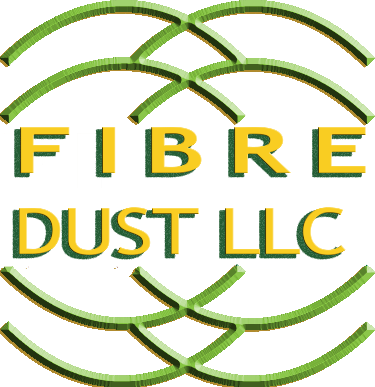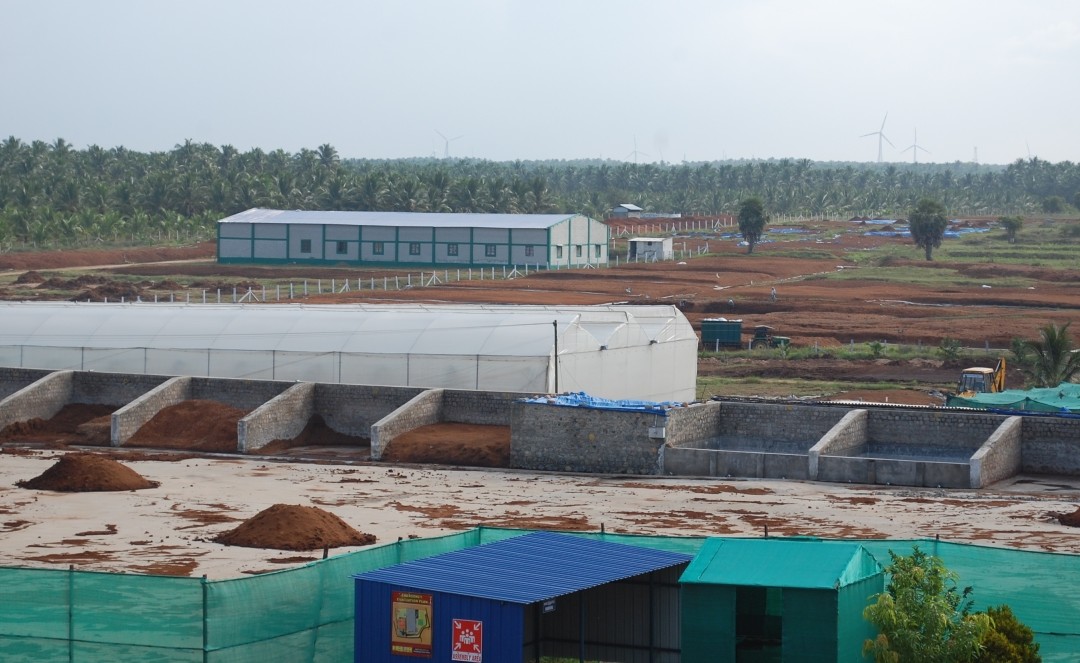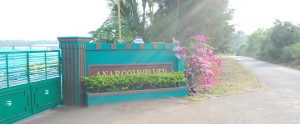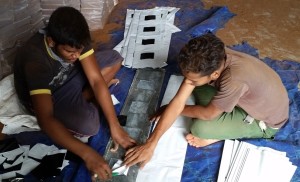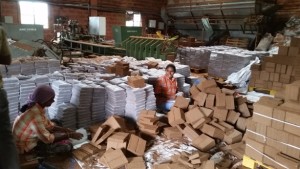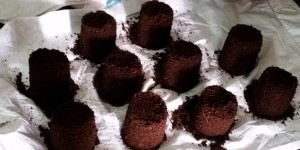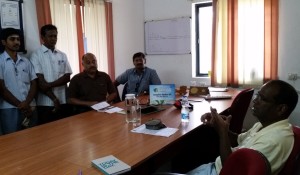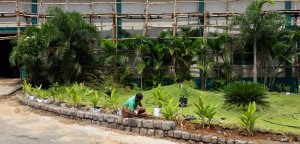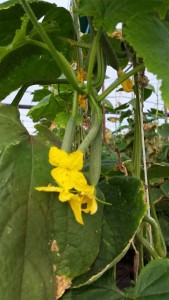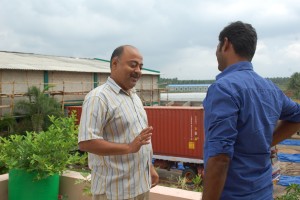Taking Quality Control Seriously
FibreDust’s primary India facility, 100 % owned and operated by FibreDust, Anar Coir Pvt Ltd, is a bustling progressive coir factory, with coco peat and chip drying yards spread out over a vast area, stretching almost as far as one can see. Maintaining quality and consistancy in production is essential. For Anar Coir, this process begins right at the gate and continues all the way to the end of the production run with final quality control checks and measurements. The management team at Anar with Satheesh Rao and Sarathy Sethuraman at the helm, is committed to consistant quality and high production standards, the environment and great worker relationships.
The Gate
Anar Coir brings in loads of both wet and dry coco pith, and small mountains of green husk daily to keep the machines running and the workers busy creating the best, most consistant agricultural coir available. Regular deliveries of raw material keep gate security and intake officials busy as they go through complete quality testing proceedures on every load brought in by hopeful vendors. For dry pith, delivered in bags, the testing begins immediately as the truck enters the gate. Moisture checks are first with testers inserting a long probe into random bags at all levels of the load. If the moisture is too high, the load is rejected before it gets to the scale. PH and EC is also checked at this stage assuring that the delivery conforms to Anar’s standards. If these measures pass quality control standards, the truck is then weighed and the bags offloaded. The truck is then re-weighed and the weight recorded. This also serves as a quality control test. If the load is too heavy, there could be excess sand, rocks or debris adding to the weight which can cause the vendors load to be rejected.
>
Not every truckload makes the cut. This load has been rejected and is on the way to sell their product elsewhere. 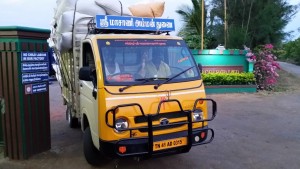 This can happen when a vendor appears on the property with a load, rather than being one of our primary vendors. Anar gives all vendors an opportunity to provide quality material, but they are held to strong standards at the gate for any “ready to use” product like dry pith.
This can happen when a vendor appears on the property with a load, rather than being one of our primary vendors. Anar gives all vendors an opportunity to provide quality material, but they are held to strong standards at the gate for any “ready to use” product like dry pith.
Wet Pith: Curing and Drying
Wet coco pith is sent in bulk and offloaded into the drying curing fields and allowed to be baked by the sun and washed by the abundant rains. When ready to be processed, it is moved to the large concrete drying yard and spread to bake in the sun. It is fluffed several times, turned over to expose all sides to the sun, then bagged for production, once testing indicates it is ready. Drainage from the bunkers and the concrete yard goes directly to a small banana plantation right on site.
Green Husk Processing
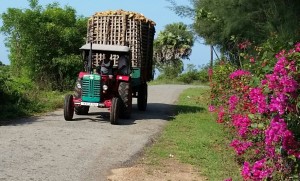 Green husk is delivered daily in tall trailers filled to the brim. Husk goes directly to the chipping centers where it is first prepared for the chipping machines
Green husk is delivered daily in tall trailers filled to the brim. Husk goes directly to the chipping centers where it is first prepared for the chipping machines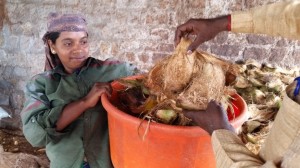 by the husk separator. Big husk chunks are first loaded into the husk separator and processed into smaller pieces that can be effectively chipped into various sizes. Green husk is used because it has a very low EC since it has not been soaked in salt water for retting. All that’s necessary after the chipping process is a relatively short curing and drying time.
by the husk separator. Big husk chunks are first loaded into the husk separator and processed into smaller pieces that can be effectively chipped into various sizes. Green husk is used because it has a very low EC since it has not been soaked in salt water for retting. All that’s necessary after the chipping process is a relatively short curing and drying time.
The husking centers are managed by woman owned contractors. Anar has encouraged the formation of several women owned businesses that operate throughout the factory, a concept intitiated by CEO Sam Ahilan. The chipping center is home to one of these businesses. This provides incentive for quality and extra earning power for these hard working women. The husk delivery trucks have a hard time keeping up with the production of the chip team. Over 20,000 husks are turned into quality coco chips daily.
Factory Production
Anar Coir produces many products from coco peat including the popular 5 kg block Customer specifications vary according to crop being grown, and blends of coco peat with various amounts of fiber and chips are produced to create the perfect growing media to meet our customer’s requests. For some, seived coco peat of a particular size is all they need. Anar and FibreDust accomodates these needs with various sized screens for seiving. The pith travels up a conveyor and falls into a vibrating seive machine. This lets only the size required fall through. The larger pieces and any debris is trapped in the seive screen. Debris is discarded, large fibers are saved for another use use. .
Another popular Fibredust product made at Anar is the 1 meter grow bag. These layflat bags are inserted with a coir “slab” that will expand upon hydrating to fill the bag. They are commonly used for hydroponic greenhouse growing and are made with varying blends of pith to chip as well, conforming to the customer demand and depending on the crop and the method used to grow it. Fibredust offers 3 standard blends but with minimum orders, custom blends and private labels are welcome. To the left, the guys the are checking a new pattern made for a four hole pre cut in the grow bags. Once they know it’s right, more patterns will be quickly fabricated and production cutting can begin.
Custom coir products for different end uses are common. FibreDust and Anar Coir products are sold under private label all over the world! Production of just the
right product blends and shapes is a specialty. As coir gains popularity as a consumer growing product, expect to see coir based products increase on retail shelves everywhere.
The wrapping of specialty products to customer specs is done by another contractor team: The Packaging and Labeling contractors. Here too, we have encouraged entreprenaurship with our women owned Packaging Team! These ladies have the best system to wrap stack and palletize thousands of units per day.
Product Testing and Quality Control
Quality control and end results are important for all of our customers. Daily, several random samples are taken of our current production runs and tested for the following criteria:
- Compressed measurements
- Weight
- Moisture Content
- Expanded Volume
- pH
- EC
Reverse Osmosis water is used for expansion tests and for pH and EC testing. The results are recorded and reported to management daily and sent to customers with demanding specifications. The process is simple but important. First the product is measured and weighed. Then it is expanded using the proper amount of water for optimal expansion. Liter by liter it’s volume is calculated by simply stacking the product in 1 liter piles. Finally the EC and pH are tested using material from the expansion test. From test to test there is usually only slight variation within tolerance. But, If test results are unacceptable, more samples are pulled and tested to help determine the problem. If worse comes to worse an entire pallet or more can be rejected. Luckily this does not happen often but Fibredust and Anar, would prefer that it happens at the factory and not at the end users location, so all major deviations are caught immediately with this ongoing system.
Worker Relations
Fibredust and Anar Coir recognize the importance of the rellationship between management and workers. No child labor is allowed in our factories. and many progressive steps are taken to assure that our workers are safe, informed and decently paid.
We encourage entreprenaurship among our employees and respect that they have chosen our company as their workplace. Weekly meetings are held with all senior staff with current orders, projections, production goals and safety on the agenda. Factory workers are then called together to let them know the goals for the week, and information about the products they are making. These meetings give workers the opportunity to have contact with higher management which is rare in many factories. If problems come up they do not fear speaking up and nothing beats a management employee celebration of a job well done. Management finds these meetings instill a sense of pride and purpose if the workers know a little about the products, where and how they may be used, and the deadlines the company needs to fulfill. It gives meaning to the tasks, and this knowledge encourages good quality control by every worker. This communication is essential to create a good working environment for the workers and the staff.
The Environment
Even though there is much rain at times in Tamil Nadu India where Anar Coir is located, there are also dry times as well. In order to put less pressure on the wells that provide Anar with water, CEO Sam Ahilan has initiated rainwater havesting from the buildings. Installing multiple tanks to hold harvested rainwater necessary for rinsing coir. With all roof valleys leading to the tanks, substantial water is harvested with each rainfall. New gutters are being installed now to capture even more of rooftop rainwater. The image shows the scaffolding erected to install the gutters. The landscaping is being installed in a mixture of native soil and coco peat, and will be topped off with coco fiber mulch for weed control.
All product that is for any reason rejected is used in Anar’s own landscaping or greenhouse. Research and development is
carried on in the on site 10,000 Sq Ft greenhouse. What started as an experiement, became an actual cucumber growing business with the first crop producing almost double the projected yield! Plans are now to add another greenhouse so that further development and sale of vegetables can be accomplished. These cucumbers were grown in our upright 5 gallon growbags, strung on lines 10 feet tall using hydroponic fertigation. The next crop has now been planted and will hopefully surpass the first in vigor and production.
Composting is also a goal at Anar. To start, bunkers will be built for product and organic material added. Composted coir will soon be available to local growers to improve the vitality of their soil. Anar will also be able to reap the benefits in their own greenhouse production. This could be part of a new product lineup, but first, Anar will perfect it.
Visiting India’s coir belt in State of Tamil Nadu is an amazing experience. Factories and drying yards, producers of various sizes pepper the landscape in which the dominant feature is the coconut palm. Coconut palms are in every view, every landscape, millions of them! This part of the country makes the most of every single part of the coconut and has done so for centuries.
The Vision of Harmony
What sets Anar Coir Prvt Ltd apart is the vision of what they are trying to create. It’s all well and good to state the fact that coir is sustainable eco friendly and renewable, but not at the expense of the workers and the workplace, not at the expense of the environment. Anar’s vision is harmony; with nature, with workers, with growing things, with recycling and rebirth. Its a vision of beauty and heart with a “we can do it” attitude. The management team at Anar are visionaries led by a visionary. They live everyday with the desire to make the world a better place, and to make Anar Coir the best coir factory in India, while producing a great product with much potential to help feed the world.
.
